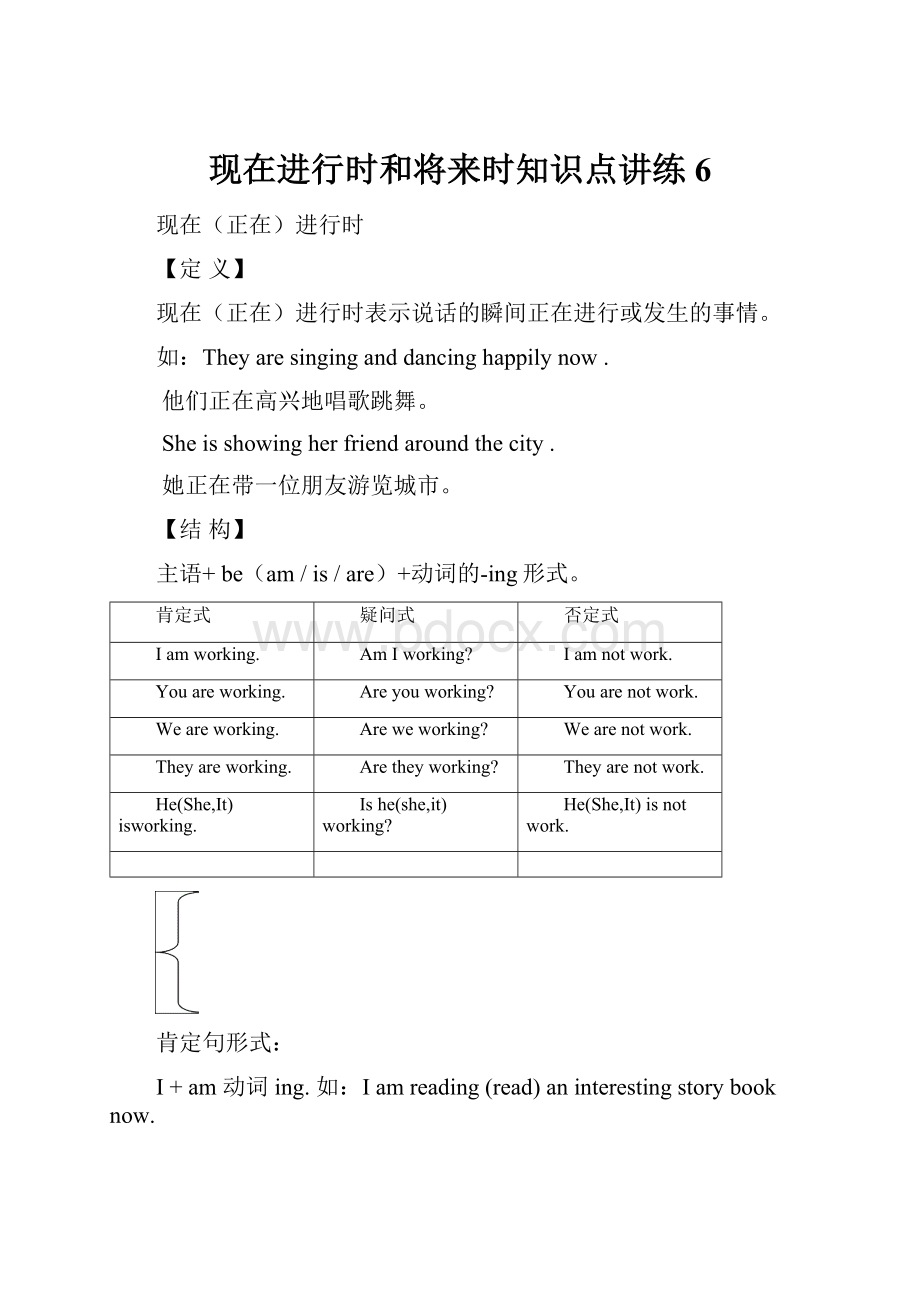现在进行时和将来时知识点讲练 6.docx
《现在进行时和将来时知识点讲练 6.docx》由会员分享,可在线阅读,更多相关《现在进行时和将来时知识点讲练 6.docx(20页珍藏版)》请在冰豆网上搜索。

现在进行时和将来时知识点讲练6
现在(正在)进行时
【定义】
现在(正在)进行时表示说话的瞬间正在进行或发生的事情。
如:
Theyaresinginganddancinghappilynow.
他们正在高兴地唱歌跳舞。
Sheisshowingherfriendaroundthecity.
她正在带一位朋友游览城市。
【结构】
主语+be(am/is/are)+动词的-ing形式。
肯定式
疑问式
否定式
Iamworking.
AmIworking?
Iamnotwork.
Youareworking.
Areyouworking?
Youarenotwork.
Weareworking.
Areweworking?
Wearenotwork.
Theyareworking.
Aretheyworking?
Theyarenotwork.
He(She,It)isworking.
Ishe(she,it)working?
He(She,It)isnotwork.
肯定句形式:
I+am动词ing.如:
Iamreading(read)aninterestingstorybooknow.
She/He/It+is动词ing.如:
Tomisreading(read)aninterestingstorybooknow.
We/You/They+are动词ing.如:
Theyarereading(read)aninterestingstorybooknow.
否定句形式:
直接在be(am,is,are)之后加not,其余照抄。
如:
Iamnotreading(notread)aninterestingstorybooknow.
Tomisn’treading(notread)aninterestingstorybooknow.
Theyaren’treading(notread)aninterestingstorybooknow.
一般疑问句:
直接将be(am,is,are)提到主语之前,其余照抄。
如:
IsTomreading(read)aninterestingstorybooknow?
Aretheyreading(read)aninterestingstorybooknow?
特殊疑问句:
首先分析划线部分的意思,确定用哪个疑问词(what,where,who,when,which,whose,how,howmany,howmuch,whatshape,whatcolour,what…doing,where…going,what…do),然后再将原句变为一般疑问句形式(即将be动词提到主语之前,其余的不变)。
如:
WhattimeisTomreading(read)aninterestingstorybook?
Wherearetheytaking(take)pictures?
【动词ing的构成规律】
情况
构成方法
例词
一般情况。
加-ing
wash-washing;catch-catching;
以不发音字母e结尾的动词
先去e,再加-ing
make-making;ride-riding;
以重读闭音节结尾的动词
双写尾字母,再加-ing
sit-sittingswim-swimming
现在进行时的时间标志短语汇总:
现在(正在)进行时常与一些固定的时间短语搭配使用:
1now“现在”
如:
Jimisplayingsoccernow.
2rightnow=atthemoment“此刻”
如:
Themonkeysareclimbingupthetreesatthemomnet.
3Look!
Listen!
“看啊!
听啊!
”
如:
Look!
Mr.Leeisworkingonthecomputer.
Listen!
Thebirdsaresinginthetree.
4Whereis…?
问题的回答,暗指说话的时候。
如:
—Whereisyourmom,Tom?
—Oh,sheiscookinginthekitchen.
5前面早就阐明是现在的短文中。
【练习】
一、用所给词的适当形式填空。
1.Myparents_______(watch)TVnow.
2.Look.Threeboys_______(run).
3.What_______yourmother_______(do)now?
4._______yourdog_______now?
(sleep)
5._______you_______(listen)tomusic?
Yes,Iam.
6.Look,MissChen_______football.(play)
7.Tomandhissister_______(wait)foryouoverthere.
8.NowClass3andClass4_______(have)atest.
9.Listen,someone_______(sing)intheclassroom.
10.——WhereisZhangYan?
——She_______(talk)withherteacherintheteacher’soffice.
11.Theboy________________(draw)apicturenow.
12.Listen.Somegirls______________(sing)intheclassroom.
13.Mymother_______________(cut)somebreadnow.
14.What_____you______(do)now?
15.Look.They_____________(have)anEnglishlesson.
16.They___________(not,play)basketballnow.
17.Look!
thegirls_______________(dance)intheclassroom.
18.Whatisourgrandmotherdoing?
She________(watch)TV.
19.It’s5o’clocknow.We____________(have)suppernow
20.Thecats(run)inthegardennow.
二、句型转换。
1.Look!
Lilyisdancing.(改为一般疑问句)
________________________________________________
2.Kateislookingforherwatch.(改为否定句)
________________________________________________
3.MrsWhiteiswatchingTV.(对划线部分提问)
________________________________________________
4.Iamdoinghomework.(改为否定句)
________________________________________________
5.Theyarewaitingforyouatthelibrary.(就划线部分提问)
__________________________________________________
三、根据中文提示完成句子:
1.小花不是在写作业,她在画画。
XiaoHua____________homework.She____________pictures.
2.今天李老师穿着一件红色的连衣裙。
MissLi____________areddresstoday.
3.你爷爷在看报纸吗?
______yourgrandpa______thenewspaper?
4.Tom和Jim在做什么?
____________TomandJim______?
5.他们是在打篮球还是在打排球?
______they______basketball______volleyball?
A
Therearenineteenboysandtwenty-eightgirlsinourclass. 1 oftheboysisEnglish.His 2 isSam.He'sthirteen.Twoofthe 3 areAmerican.Theyaretwins. 4 namesareJaneandJoy.Theyaretwelve.Theyaremy 5 .AllofTheotherboysandgirlsare 6 . 7 allliketheEnglishboyandtheAmericangirls, 8 theylikeus,too.Weplaygamestogether(一起).Wehelp 9 andtheyhelpus.
Look,therecomethetwins!
They're 10 thisway.Let'ssayhellotothem.
l.A.One B.Two C.Three D.Four
2.A.school B.sister C.brother D.name
3.A.brothers B.sisters C.girls D.boys
4.A.Your B.Their C.Our D.Her
5.A.teachers B.friends C.brothers D.students
6.A.Chinese B.English C.American D.friends
7.A.They B.We C.Them D.Our
8.A.but B.or C.and D.so
9.A.her B.them C.him D.you
10.A.come B.go C.coming D.going
B
MyfriendnamedSteveandIdecidedtosleepintheopenair.Ifoundthesleepingbagsunderthebedinmyroom.Ialsopackedsomesnacks(零食).Wecouldhardlywaitforittogetdark.Weopenedoursleepingbagsandputthemonthegrassinfrontofmyhouse.SteveandIplayedsomegames,talkedaboutsomethinginterestingandhadasnack.Intheenditgotdark.WewerejustfallingasleepwhenWeheardsomethingunusual.
“Maybeitisjustasmallanimal,”Isaid.Stevesaidnothing,butIcouldfeelhewasfrightened.AfterIlookedaround,Iwassureitwasn’tananimal.Itwasmylittlebrother,Tommy.
“Whatareyoudoinghere?
”Iasked.“Youknow,Tommy,youfrightenedus.”
“Sorry,Bill,”hesaid.“It’shotintheroom.Iwanttosleepoutsidewithyou.”
“Well,OK,”Isaid.“Justcomeandliedownnexttous.”
“Goodnight,BillandSteve,”saidTommy.“Andthanks.”
() 1.WheredidSteveandBilldecidetosleeplastnight?
A.InSteve’shouse. B.InBill’shouse. C.OutsideSteve’shouse. D.OutsideBill’shouse.
() 2.WhendidBillfindthesleepingbags?
A.Beforeitgotdark. B.Afteritgotdark. C.Atmidnight.D.Thismorning.
()3.HowdidStevefeelwhenheheardsomethingstrange?
A.Sad. B.Angry. C.Happy. D.Afraid.
() 4.WhatdidTommycomeoutofthehousetodo?
A.TodrinkwithBill. B.ToeatfoodwithSteve .C.TosleepwithBillandSteve. D.ToplaygameswithBillandSteve.
() 5.Howmanypersonssleptintheopenairatlastinthestory?
A.Two. B.Three. C .Four. D.Five.
一般将来时态(Thefutureindefinitetense)
一、 什么叫做一般将来时
(1)一般将来时表示将要发生的动作或情况。
例如:
Iwill(shall)arrivetomorrow.我明天到。
Willyoubefreetonight?
你今晚有空吗?
Wewon’t(shan’t)bebusythisevening.我们今晚不忙。
(2)在一般将来时的句子中,有时有表示将来时间的状语,有时没有时间状语,这时要从意思上判断是否指未来的动作或情况。
例如:
Willshecome?
她(会)来吗?
We’llonlystayfortwoweeks.我们只待两星期。
Themeetingwon’tlastlong.会开不了多久。
表示未来的时间状语
tomorrow明天,nextyear明年,fromnowon从现在起,inamonth一个月之后,inthefuture将来,等。
today今天,thisevening今天晚上,thisweek这个星期,thismonth这个月,thisyear今年,等。
二、一般将来时的用法
一般将来时的用法
(1)
在以第一人称I或we作主语的问句中,一般使用助动词shall,这时或是征求对方的意见(a),或是询问一个情况(b)。
will用于第二、三人称。
除英国外的说英语的国家,在陈述句中,即使在第一人称一般也用will,在英国也有这种趋势。
在口语中,常用shall,will的缩写形式为’ll,如:
I’ll,you’ll等。
Shallnot的缩写式为:
shan’t,willnot的缩写式为:
won’t.
肯定句:
I/Weshall/willgo. You/He/She/TheyWillgo.
否定句:
I/Weshall/willnotgo.You/He/She/TheyWillnotgo.
疑问句:
ShallI/wego?
Willyou/he/she/theygo?
:
( a).Whereshallwemeet?
我们在哪儿碰头?
(b).Shallwehaveanyclassestomorrow?
明天我们有课吗?
在这类问句中,近年来也有不少人用will,特别是在美国。
例如:
HowwillIgetthere?
我怎么去?
一般将来时的用法
(2)
begoingto+动词原形
a.表示打算、准备做的事。
例如:
Wearegoingtoputupabuildinghere.我们打算在这里盖一座楼。
Howareyougoingtospendyourholidays?
假期你准备怎样过?
b.表示即将发生或肯定要发生的事。
例如:
Ithinkitisgoingtosnow.我看要下雪了。
There’sgoingtobealotoftroubleaboutthis.这事肯定会有很多麻烦。
c.“will”句型与“begoingto”句型,前者表示纯粹将来,后者表示打算、计划、准备做的事情,更强调主语的主观意愿。
例如:
TomorrowwillbeSaturday.明天是周六了。
WearegoingtovisitParisthissummer.今年夏天我们打算游览巴黎。
一般将来时的用法(3)
“be+不定式”表示安排或计划好了的动作。
Whenaretheytohandintheirplan?
他们的计划什么时候交上来?
ThequeenistovisitJapannextyear. 女王将于明年访日。
一般将来时的用法(4)
“beabout+不定式”表示即将发生的动作。
Heisabouttoretire. 他即将退休。
TheEnglisheveningisabouttobegin. 英语晚会即将开始。
注意:
beaboutto一般不与时间状语连用。
一般将来时的用法(5)
come,go等动词用“一般现在时”表示按规定、计划或时间表将要发生的事。
Hestartsnextweek. 他下个星期出发。
Weleaveverysoon. 我们很快就离开。
Thetrainstartsat10o'clockinthemorning. 火车将在早上10点开出。
这类用法限于表示"移动"的动词:
come来,go去,leave离开,start出发,begin开始,arrive到达,depart离开,stay逗留,等。
一般将来时的用法(6)
come,go等动词在口语中用“现在进行时”表示主语计划将要作的动作。
TheyareleavingforNewYorktomorrow. 明天他们将要动身前往纽约。
Isyourbrotherdepartingsoon?
你的兄弟很快就要启程吗?
这类情况常与come来,go去,leave离开,start开始,begin开始,arrive到达,depart离开,stay逗留,等动词连用。
所用的动词必须是动作而不是状态,主语必须是人。
★★★一般将来时的用法(7)
状语从句(时间状语从句,条件状语从句等)用现在时表将来。
也就是说状语从句中不能出现一般将来时的表达表达式。
Wewon’tgotopicnicifitrainstomorrow.if引导的是一个条件状语从句,故从句用rain的一般现在时形式rains表示明天的状况。
学生常见错误如下:
一、易忽视动词用原形形式
例:
1Hewillis(be)atschoolnextMonday.
2Heisgoingtodoes(do)hishomeworkafterschool.
解析:
第一题有的同学一看he做主语就用了is,忽视了will后应加动词原形。
我们在写句子时,很容易把动词丢掉,“英语句子里,动词不能少”的规律必须要牢记。
第二题中to后加动词原形,而不是用单三人称.。
二、begoingto+动词原形与will+动词原形用法不清楚
例:
我正努力学习,准备参加英语考试。
IamstudyinghardandIwilltryformyEnglishexams.
答案:
IamstudyinghardandIamgoingtotryformyEnglishexams.
解析:
“begoingto”表示计划、打算要做某事。
E.g.Heisgoingtovisithisfriends.还表示某种迹象表明会发生某事.e.g.Lookattheclouds.It’sgoingtorain.而“Will+动词原形”指对将来事物的预见、表示意愿、决心。
E.g.Iwillwaitforyouuntilyoucome.在单纯预测未来时,二者可以互换,但在此题中只能用begoingto,而不能用will。
课堂自主检测:
(一)、单选
()1._____you____adoctorwhenyougrowup?
AWill;goingtobe BAre;goingtobe CAre;/ DWill;be
()2.Idon’tknowifhisuncle_____. Ithinkhe_____ifitdo